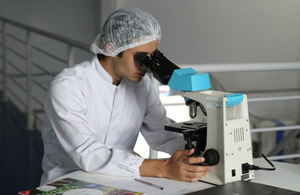UK-China partnerships against antimicrobial resistance get funding
Funding announced today demonstrates co-operation between UK and China to address the issue of antibiotic resistance.

On the day that the UK Government publishes its strategy to tackle antimicrobial resistance (AMR), the UK鈥檚 innovation agency, Innovate UK is announcing winners of two research competitions to address the issue of infections resistant to antibiotics both in humans and in animals.
On behalf of the Department of Health and Social Care (DHSC), Innovate UK has completed two research competitions that will award 拢20 million of research funding for AMR research. This includes a bilateral research competition between DHSC鈥檚 Global AMR Innovation Fund (GAMRIF) and the , and a competition as part of the Small Business Research Initiative (SBRI).
GAMRIF鈥檚 UK-China research competition supports new innovations to address antimicrobial infections in both humans and animals, which together constitute a significant threat to human health. Successful projects are a partnership of UK companies and research organisations, with Chinese companies and research organisations. 拢10 million of UK aid funding has now been awarded to UK partners, with MoST providing funding for the Chinese partners who will receive up to a total of 60 million RMB.
These partnerships will enable novel research to be conducted that neither country could carry out alone within the same time frame.
In total, 14 projects were selected and will run over the next three years. These projects include a diverse range of innovations, such as novel diagnostics, therapeutics, and animal feed, as well as opportunities from traditional Chinese medicine for treating or preventing infectious bacterial disease.
The results of this research will have global implications including in China and across emerging and developing countries.
Among these projects, are a collaboration between , based in Plymouth and the , , which plans to use a bovine virus as a safe, inexpensive, single dose vaccine to control Streptococcus suis infection in domestic pigs. Also working with SHVRI, CAAS is in Watford, who have collaboratively proposed to develop a non-antibiotic treatment of multi-drug resistant organisms in poultry.
Professor Dame Sally Davies, England鈥檚 Chief Medical Officer, said:
Drug resistant infections claim hundreds of thousands of lives across the globe. An innovative and international response is vital 鈥� this latest collaboration between the UK and China guarantees much needed research to address the complex and world-wide issue of AMR
Dr Kath Mackay, Interim Director - Ageing Society, Health & Nutrition, Innovate UK said:
Antimicrobial resistance is one of the biggest global challenges in healthcare. It has been estimated that the AMR threat could lead to 10 million extra deaths a year and cost the global economy up to 拢75 trillion by 2050.
This partnership between China and the UK鈥檚 world-leading bio-industry is a vital contribution to tacking this issue through international co-operation.
A further 拢10 million has been awarded to UK organisations as part of the SBRI to develop solutions to AMR in humans. This competition focuses on two strands of research; new therapies and infection prevention and control.
Of the 13 projects selected across business and academia, 9 are led by small and medium enterprises who will translate AMR research into industry.
Winners include a project from Surrey-based Clean Blue Ltd that will develop an anti-infective medical device. , based in London, has also received funding to use magnetic blood filtration to treat antibiotic resistant bacterial sepsis.